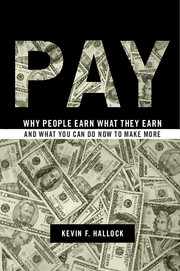Book contents
- Frontmatter
- Contents
- Figures
- Tables
- Acknowledgments
- PART I HOW HARD CAN THIS BE?
- PART II HOW ORGANIZATIONS SET PAY STRUCTURE AND WHY
- PART III HOW PEOPLE ARE PAID CAN MEAN AS MUCH AS HOW MUCH THEY ARE PAID
- PART IV WHAT YOU CAN DO TO MAKE MORE AND CONCLUDING COMMENTS
- 14 What You Can Do Now to Make More Now and Later
- 15 Concluding Thoughts on Pay
- Notes
- References
- Index
15 - Concluding Thoughts on Pay
from PART IV - WHAT YOU CAN DO TO MAKE MORE AND CONCLUDING COMMENTS
Published online by Cambridge University Press: 05 October 2012
- Frontmatter
- Contents
- Figures
- Tables
- Acknowledgments
- PART I HOW HARD CAN THIS BE?
- PART II HOW ORGANIZATIONS SET PAY STRUCTURE AND WHY
- PART III HOW PEOPLE ARE PAID CAN MEAN AS MUCH AS HOW MUCH THEY ARE PAID
- PART IV WHAT YOU CAN DO TO MAKE MORE AND CONCLUDING COMMENTS
- 14 What You Can Do Now to Make More Now and Later
- 15 Concluding Thoughts on Pay
- Notes
- References
- Index
Summary
This book is about why people earn what they earn and how you can make more. But just as we discussed that wages and salaries are just a part of compensation, remember that your pay is just a part of your job and your job is just a part of your life. I don't think the goal should be to make as much money as possible. Rather, we should strive to do good things and be happy. If, on the margin, you can do some things to make more money along the way – great!
As I noted at the beginning of this book, designing pay plans is not rocket science. But it isn't easy either. In fact, I think it is part science and part art. It is also part economics, part law, part organizational behavior, part industrial relations, part accounting, part finance, part sociology, and part psychology. There are no specific rules that will help organizations get it exactly right. But there are important principles. The fact that there are no simple rules is not obvious to many people until they really think about it. Different firms, even in the same industry, may have drastically different compensation programs and systems and that may actually be the right outcome. Organizations design their optimal business strategy and then compensation strategy for what is best for them.
- Type
- Chapter
- Information
- PayWhy People Earn What They Earn and What You Can Do Now to Make More, pp. 196 - 198Publisher: Cambridge University PressPrint publication year: 2012



